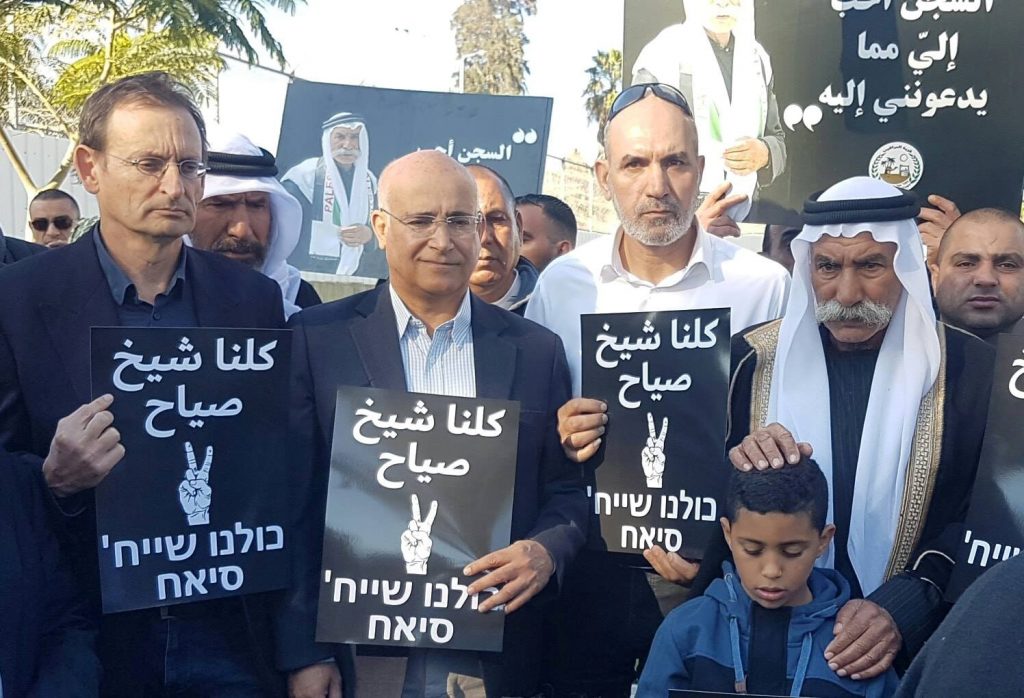At the age of 69, Sheikh Sayeh Abu-Madi’am, a prominent figure in the Arab-Bedouin’s struggle with the state over the control of land in the Negev, entered Ma’asiyahu prison in Ramle on Tuesday, December 25, accompanied by a convoy of cars and hundreds of people, among them: Joint List Chairman, MK Ayman Odeh, MK Dov Khenin (Hadash – Joint List) and Hadash activists.
Abu-Madi’am, who lives in the unrecognized village of Al-Araqib, was sentenced to 10 months in jail for “trespassing on land,” and the Supreme Court recently confirmed the sentence.

Sheikh Sayeh Abu-Madi’am (first from right) is accompanied by hundreds of supporters before his entrance into Ramle’s Ma’asiyahu prison on Tuesday to begin serving a 10-month sentence for trespassing on his own land. MK Dov Khenin (Hadash, first from left) is holding one of the “We are all Sheikh Sayeh” placards distributed to demonstrators, (Photo: Zu Haderech)
The disputed Al-Araqib land lies south of the Bedouin city of Rahat, and stretches over a wide area between Rahat and Be’ersheba. Members of the Al-Turi tribe, to which Abu-Madi’am belongs, claim that ever since the days of Ottoman rule in the country, they have been working the land in question as part of their semi-nomadic existence. The tribe also claims that the Ottoman rulers and the subsequent British Mandatory government recognized the tribe’s rights to the land.
In 1953, the Knesset passed a law that resulted in the expropriation of hundreds of thousands of dunams of land in the Negev, including the Al-Araqib land. In the 1970s, the state registered the area as state land and called upon Bedouin residents to assert any claims that they had to ownership interests there. More than 3,000 claims were filed, pertaining to large expanses. In 2016, the State Comptroller published a report stating that of the 590,000 dunams (150,000 acres) over which ownership had been claimed in 2007, the fate of only 16,000 dunams had been resolved.
In May 2015, after lengthy legal proceedings involving documents and the testimony of experts and tribal elders, the Supreme Court rejected the claims of the Al-Turi tribe. The case before the court only related to a portion of the disputed land, the land relating to Al-Araqib. The ownership of other land over which Abu-Madi’am is still fighting is pending before the Be’ersheba District Court.
Structures built by Bedouin at Al-Araqib have been demolished by the state on more than 130 occasions over the decades. The largest demolition operation was carried out in 2010, with the protection of 1,000 police officers. Since then, a small group of people has been waging the stubborn campaign against the authorities that led to criminal charges against Abu-Madi’am.
“I used to go to the home of a Jewish friend and be welcomed as a brother. He would come to my home and be treated like a member of the family,” he said to Haaretz. “The government we have now, this racist right-wing government, has made me look ahead, thinking that Arabs have no future in this country.”
Related: Posts on the Arab-Bedouin struggle for their home is Al-Araqib


